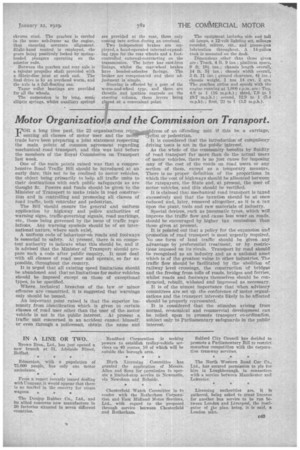Motor Organizatior s and the Commission on Transport.
Page 27

If you've noticed an error in this article please click here to report it so we can fix it.
VOR a long time past, the 22 organizations repots seating all classes of motor user and the ino
trade have been preparing a joint .statement respecting the main points of common agreement regarding mechanical road transport, and this was laid before the members of the Royal Commission on Transport last week. • One of the main points raised was that a comprehensive Road Traffic Bill should be introduced at an early date, this not to be confined to motor vehicles, the object being primarily to help, all traffic units to their destinations with such public safeguards as are thought fit. Powers and funds should be given to the Minister of Transport to make trials in road construction and in controlling and promoting all classes of road traffic, both vehicular and pedestrian.
The Bill should ensure the general and uniform application by highway and police authorities of warning signs, traffic-governing signals, road markings, etc., these being governed by the issue of traffic regulations. Any warning symbols should be of an international. nature, where such exist.
A uniform code of behaviour-oil roads and footways Is 'essential to safety. At present, there is no competent authority to indicate what this should be, and it Is advised that the Minister of Transport should prepare such a code after public enquiry. It must deal with all classes of road user and operate, so far as possible, throughout the country.
It is urged that all existing speed limitations should be abandoned and that no limitations for motor vehicles should be •imposed except on those of exceptional types, to be specified.
Where technical breaches of the law or minor offences are committed, it is suggested that warnings only should be issued.
An important point raised is that the superior hninnnity from, identification which is given to certain classes of road user other than the user of the. motor vehicle is not in the public interest. At present a traffic unit concerned in an accident cannot. himself, or even through a policeman, obtain the name and -1dress of an offending Unit if this be a carriage,
cyclist or pedestrian.
It is considered that the introduction of compulsory driving tests is not -in the public interest.
As the whole of the community benefits by fluidity of -road transport far more than do the actual .users of motor vehicles, there is no just cause for imposing any of the cost of the roads on road users or any section of them, except as' a temporary measure. There is no proper definition of the proportions in which the cost of highways should be allocated between the ratepayers, the State and, at present, the user of motor -vehicles, and this should be rectified.
It is claimed that mechanical road transport is taxed excessively and that the taxation should be at once reduced and, later, removed altogether, as it is a tax upon the plant, tools and raw materials of industry.
Special devices, such as brieumatic tyres, which will improve the traffic flow and cause less wear on roads, should be encouraged by higher tax remissions than those given at present.
It is pointed out that a policy for the expansion and promotion of road transport is most urgently' required. No one form of land traffic should he given any advantage by preferential treatment, or by restrictions -imposed on its rivals. Transport by road should he recognized as an industry and as a national asset which is of the greatest value to other industries. The traffic flow should be facilitated by the abolition of railwaY level crossings, the construction of bridges and the freeing from tolls of roads, bridges and ferries, whilst roads and footways themselves should he constructed, -rebuilt, widened and improved as necessary.
it is of the utmost importance that when advisory committees are set up the conference of motor organizations and the transport interests likely to be affected should he properly represented..
it is considered _ that the stimulus tithing from normal, economical and commercial development can be relied upon to promote transport co-ordination, subject only to Parliamentary safeguards in the public interest.


































